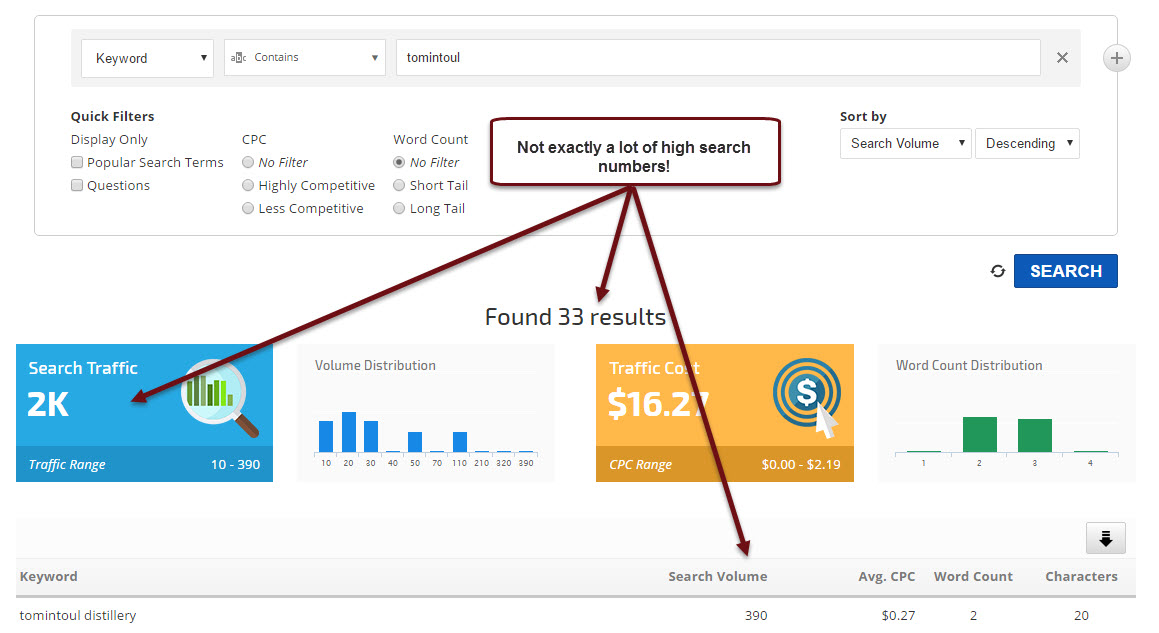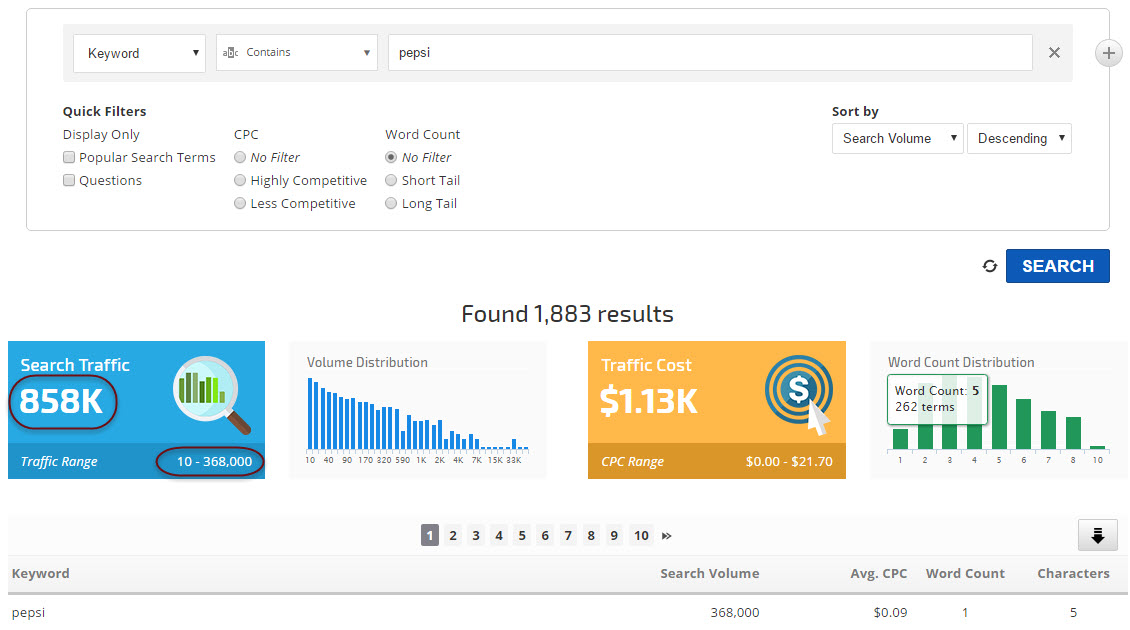Posted by
Mordy Oberstein
Branding, aside for the word’s origins relating to the cruel and unusual punishment of animals, is a powerful concept that in many ways serves as the life-force of modern marketing mania. We all use it, support it, and in some of life’s most precarious situations…. live by it (think brands related to medical care…. hospital networks, health insurance, medical equipment, etc.). Brands, and the associations that come along with them, are powerful entities that many businesses, beyond even the brands themselves, capitalize on in a variety of ways. Whether it be content creators, ad campaign managers, or product placement managers, brands, and the power they wield, play a central role in any marketing strategy.

Considering the broad economic muscle that brands carry, performing ongoing brand analysis is an essential and common business practice, and what better way to analyze a brand’s popularity and trendiness than with online keyword research. As odd as it sounds, keyword research is a potent way to perform brand analysis. For those of you who may be skeptical of the ability of keyword research to help analyze brand power, allow me to demonstrate using Rank Ranger’s keyword research tool – Keyword Finder – in this, the first installment of a two part keyword research for brand analysis series!
Harnessing Keyword Research for Brand Analysis
Let’s start with the basics – overall brand strength analysis. Seeing just how strong and popular a brand is can be applicable within a variety of settings. Let’s deal with the perspective of the brand themselves. By way of example, imagine you are the CEO of Nike, (come on, just do it…), I’m sure there are a plethora of overly complex financial reports that come across your desk indicating just how well the brand is performing. Why in the world would you want the simplicity of solid online keyword research when you can have financial reports with all sorts of fancy charts and extravagant tables full of really really really interesting data? What can keyword research tell you that your income and expense reports can’t?
How popular are you? Sure, your revenue reports can tell you how much money your brand has brought in, but can they tell you how popular you are? Can financial reporting tell you if you’re trending upwards, or heading dangerously downwards? Brand power is a lot like high school, popularity is everything! Sure, your brand may have had the best deals and the most aggressive marketing thereby bringing in truckloads of money, but are you really in vogue? In other words, your sales can’t tell you how in touch you are with people as a brand per se. Revenue can indicate how well a series of products performed, but keyword research is an invaluable tool that shows you how popular your brand is with the general populace. Think about it this way, do you just offer a good product at a great price, or are you sincerely popular with people (which is a more intrinsic and profound likability that wields more power)?
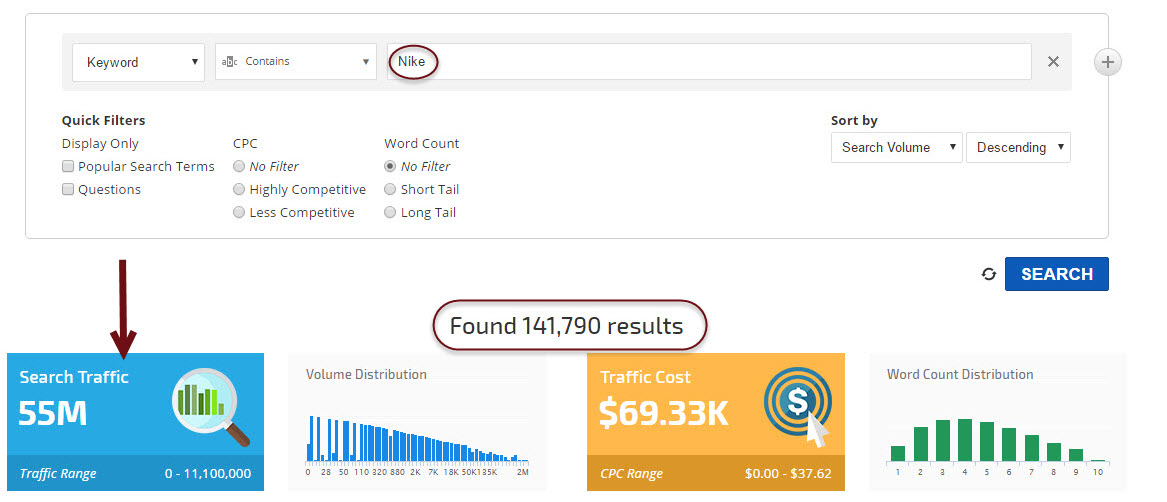
Fig 1. Aggregate keyword results data on Keyword Finder for keywords that contain the brand name “Nike,” showing a total of 55 million searches with 141,790 results
Perhaps just as significant as monitoring the popularity of your own brand is tracking just how popular your competitors are. You might be the revenue king now, but if you see less and less people searching for your brand on Google with each passing month, while that hip new brand sees the inverse, wouldn’t you want to pay attention to that? Tracking your competitors’ search volume over a period of time can afford you insight into your brand’s overall health. I’m sure Nike would like to see if Adidas is pulling in more search volume as time progresses.
More than just insight into overall brand popularity, keyword research tells you what’s on the minds of people curious about your brand. Sure, your brand might conjure up millions of searches, but if the top search is why is this brand so lousy?, well then you definitely have a problem there. Keyword research allows you to track your brand’s identity. If you as a brand are pushing a certain image, is that image coming through, is that image really on the minds of people at large? Pinpointed keyword research can help answer that question.
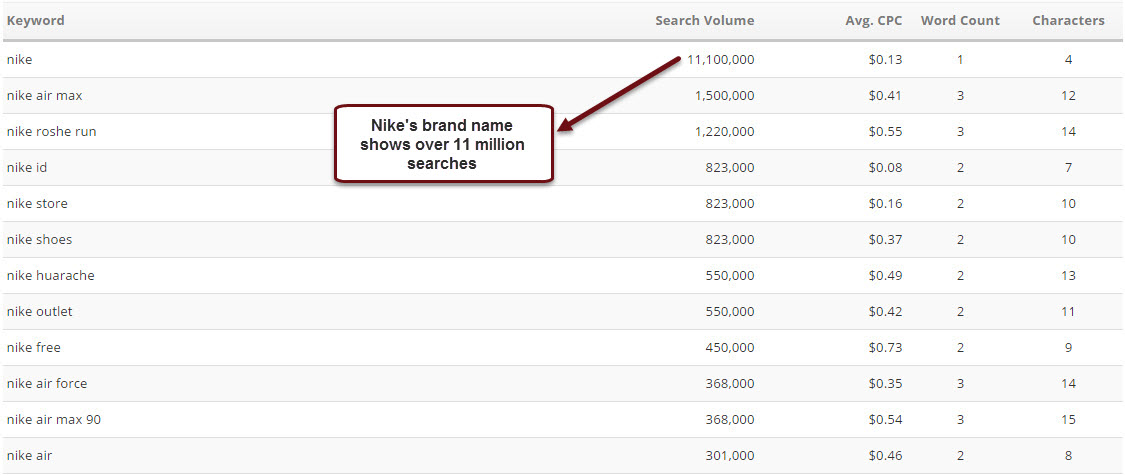
Fig 2. Keywords related to a search for “Nike” indicate the brand name having been searched for over 11 million times
Let’s stick with the example of Nike. Back when I was a kid, my immediate association to Nike was Michael Jordan and the almighty Air Jordan line of sneakers. Time warp back to 1996, and if I was the CEO of Nike and saw the above keyword results, with no mention of Michael Jordan or “Air Jordan,” I might have a significant branding problem on my hands.
How Content Creators Can Take Advantage of Keyword Research for Brand Analysis
Using brand analysis as part of a content creation strategy is more prevalent than you might think. Consider that whenever content centers on a product, whether it be a review or marketing materials per se, that product is part of a brand (usually). There are really so many variations of using keyword research for brand analysis within content creation that it would be impossible to list them all. Doing so would be like trying to catch every last Pokemon, you’d have to wander in desolate areas for hours like some sort of drugged zombie.
Analyzing Brands and Developing Written Content
Within the framework of developing content marketing, there are simply endless ways to incorporate brand analysis via keyword research into the process. Take product reviews for example. Say you were fortunate enough to combine your passion for good scotch-whisky with your ability to create catchy content. Imagine you walk into work one day and your editor yells out from behind their glassed-in office that they want a 500 word article reviewing the product line of one of the big names in scotch. Not a problem for you, you’ve tasted them all a half a dozen times. You sit down at your computer and as you’re about to begin typing you ask yourself one essential, yet basic question, “How do I know which brand will bring in the readers?” And now it becomes obviously clear why you need keyword research in order to perform brand research, in order to create popular content, in order to get your editor to stop yelling at you from behind their glass office!
Just in case you don’t believe me. I personally really enjoy Tomintoul’s line of scotches very much. I find them crisp, smooth, and they’ve launched a host of new whiskies since 2003. To me, they would be a great place to start and write a review. A great place to start until I did some keyword research. It turns out that the brand name has a total search volume of just 2K and there are only 33 keywords that incorporate the brand name!
Fig 3. A keyword search related to the brand “Tomintoul” results in some less than impressive search numbers
On the other hand, Glenlivet, the old and established scotch producer has a band name that comes up with 416 results and a total search traffic of 143K! While I may personally think the brand is not as new and exciting as say a brand like Tomintoul, it is certainly far more popular, thereby increasing the chances of my review being popular as well.
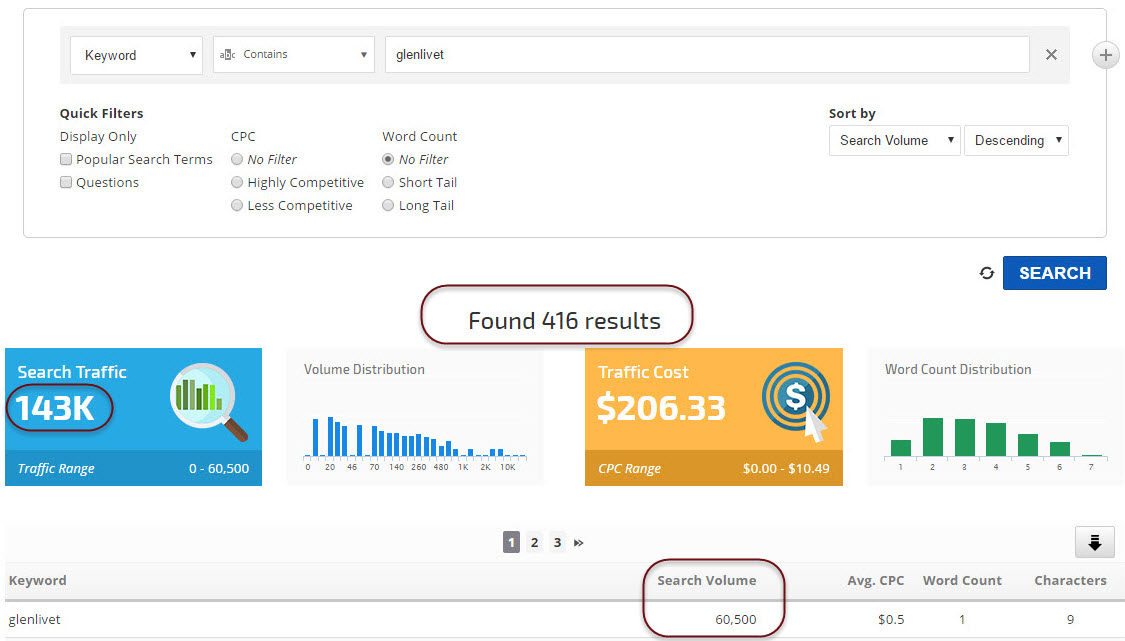
Fig 4. The brand “Glenlivet” displays a Total Search Volume of 143K searches with its brand name keyword indicating 60,500 searches
Just to bring the matter full circle, even beyond the overall brand analysis, keyword research provides specific insight into what forms a brand’s “power.” Keeping with the above scenario… so fantastic, I’ve used my keyword tool to determine which brand of scotch my readers would most likely want to read about. However, the real beauty here is that keyword research can tell me which aspects of the brand hold the most power. From a content creation standpoint I want to hit on the relevant topics within a specific brand. Seeing which keywords related to the brand produce the highest search volume is a natural indicator.

Fig 5. Keyword results for “Glenlivet” present a higher search volume for its 18, 21, and 15 year old scotches, with a drop-off in its line of 12 and 25 year old products
In the case of Glenlivet, there is a big drop off between the search volume related to their 18, 21, 15 year old scotches when compared to their 12 year old and 25 year old products. It may be that the 12 year old is not as prestigious as say the 18 year old batch, and the 25 year old scotch could just be too expensive for the average drinker. If I want to write a scotch review for the masses, based on my keyword research I would certainly focus on the brand’s 15, 18, and 21 year old whiskies.
Using Keyword Research to Analyze Brands for Media Content Creation
When thinking of contexts in which to use keyword research to perform brand analysis, media content creation has to the be the coolest of them all! Nothing says media like TV, so let’s start there. Most of us have seen those shows on TV where they give you a look at how some sort of product is made, be it food, or some new technology, etc. Now, how cool would it be to be the producer of one these kinds of shows, right? Right… until you actually had to figure out what product to feature next! For arguments sake, say you’ve narrowed it down (by using keyword research of course) to “soda.” You are going to show us, the masses, how soda gets from the factory to our tables in the latest installment of what must be an amazingly popular show, How Does It Get to My Table? Of course you have a variety of soda brands to choose from, so how do you pick?
You might think Coke… Pepsi… they’re both major brands, does it really matter? Intuitively speaking, this may actually sound plausible until you use keyword research to perform brand analysis that is! When I ran the brands through Keyword Finder, the numbers were rather surprising. I never would have thought that Pepsi would be so far behind Coca Cola, never. Pepsi on its own, not compared to another brand, just didn’t show the numbers I would have expected it to based upon its general popularity, it only presented a total search volume of 858K.
Fig 6. The major soda brand “Pepsi” displays an unexpectedly low Total Search Traffic of under one million searches
When comparing the two brands, Coca Cola is the dominant winner, with a Total Search Traffic advantage of more than five million searches. Coke’s brand dominance is further accentuated when we look at just how competitive its average Adwords cost per click is. A “Coca Cola Click,” on average, was $2.00 more expensive than a “Pepsi Click,” thus indicating a higher level of competition/popularity.
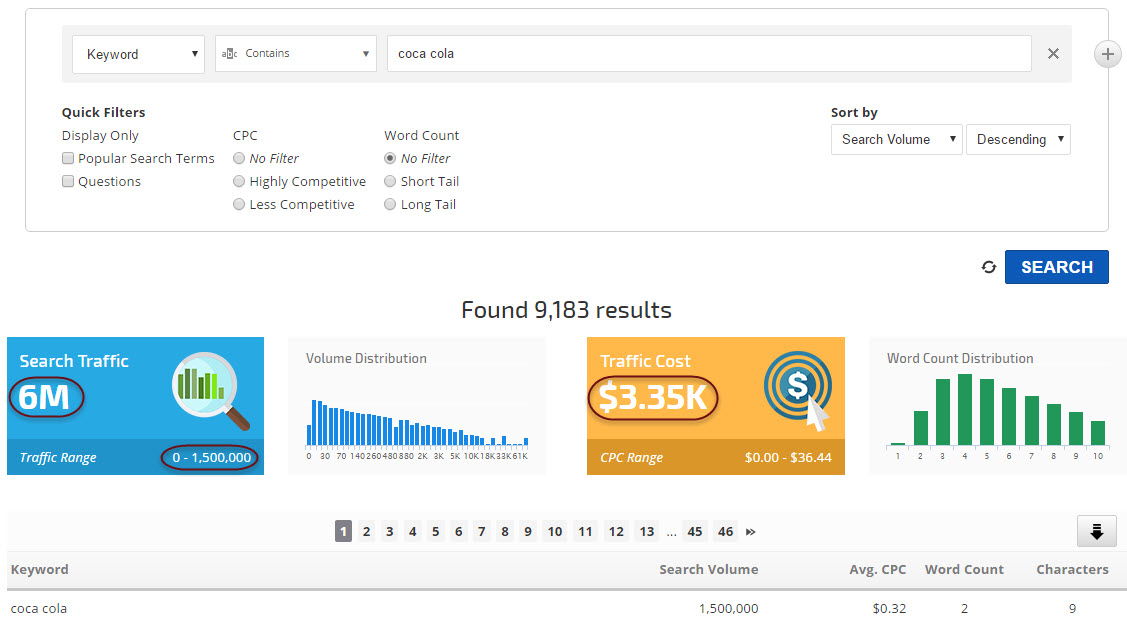
Fig 7. “Pepsi” rival “Coca Cola” shows a Total Search Traffic that consists of over five million more searches than that of “Pepsi”
What’s important to consider is that keyword research is not based upon revenue reports, it doesn’t consider how leveraged Pepsi is relative to Coke, etc. It has nothing to do with gains and losses and everything to do with popularity. Keyword research answers one (actually more than one) question, which brand are people interested in? Which in the case of a TV show producer looking to go behind the scenes, is all they really care about. What’s really nifty, when using Keyword Finder, is that you can actually see what questions about the brand people want to know the most!

Fig 8. A keyword search for the “Coca Cola” brand set to show only those keywords that are in question form
If I was such a producer of such a show, this would be marketing gold to me, as I know exactly what topics to fill my show with and how to market it. In the case of Coca Cola, I would be a fool not to discuss who invented the soft drink as well as where and when it was first created.
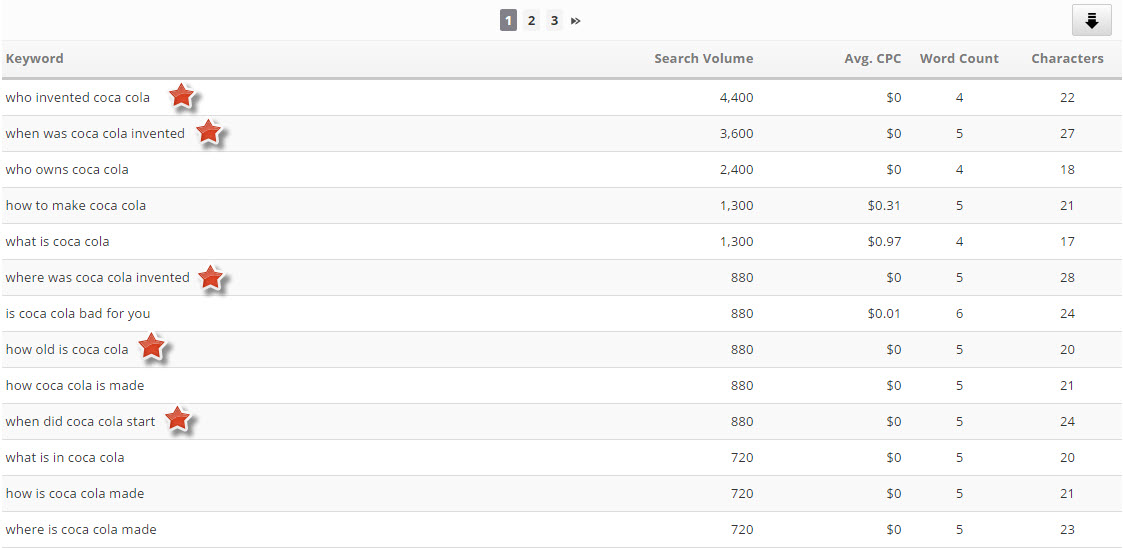
Fig 9. Keyword results for “Coca Cola” in question form, many of which relate to the brands origins
The Advantage Keyword Research Gives to Brands and Content Creators
The advantage of using online keyword research to determine the health and power of a brand is in its ability to offer a unique vantage point. Keyword research offers brands the ability to look beyond the numbers and delve into the the power and reach of their brands in a more holistic fashion. By employing online keyword research, brands are able to see get a genuine glimpse into their overall social impact and subsequent popularity. This insight into brand popularity is a facet of brand power that content creators can easily capitalize on. Having the ability to see how a specific brand resonates with the overall population is a powerful tool for any content creator who wants to gear their content towards what is popular and trending.
While the implications of using keyword research for brand analysis are profoundly far-reaching for brands themselves and for content creators as well, they are certainly not the only ones who can benefit from the practice. Advertisers and marketers have the ability to analyze brands via keyword research in some of the most interesting and creative ways. Keep an eye out for the second installment of How to Use Keyword Research to Perform Brand Analysis and join me as I endeavor to show you how advertisers and marketers can capitalize on keyword research when seeking to analyze brand power.

